Rick's b.log - 2011/06/20
You are 3.145.100.150, pleased to meet you!
Rick's b.log - 2011/06/20 |
|
| It is the 3rd of December 2024 You are 3.145.100.150, pleased to meet you! |
|
mailto: blog -at- heyrick -dot- eu
This brings us to the question of violence. Violence in animation is nothing new - perhaps the main difference between Japanese and Western animation is that the Japanese are quite happy to have human characters inflicting violence on each other. While we in the West can't handle the real purpose of panty liners so their capacities are demonstrated using blue water. Likewise, we can't quite manage to have people slaughtering each other in animated form (as we still seem to want to associate animation with children), but it is fine to show ducks and birds and wolves and cats and mice beating seven shades of <beeeep!> out of each other. This is, to my mind, worse. As while your average child probably shouldn't be watching a lot of the violent animé, the likes of "Tom and Jerry" are aimed at children. I wonder how many young children thought it might be acceptable to hit a cat over the head with a frying pan.
While extreme violence in animé is nothing new (the infamous ArtMic production GenoCyber cut in 'live' clay-model-covered-in-ketchup footage as the animated gore wasn't convincing enough), not to mention the seemingly endless piles of Mecha blasting the crap out of each other with increasingly bigger weapons, the fact is that mindless violence gets a bit wearing, and rapidly becomes stupid... at least to a literate animé viewer. The mindless masses seem to enjoy it, but then they are perhaps the same sorts that watch programmes with titles like "WWF Smackdown".
Then we come to "Shiki", a delightfully quirky and slow moving series that involves a group of eccentric characters in a tiny town in the back of nowhere. What we viewers figure out pretty early on is that the newcomers to town are vampires (Shiki, said like "sh-key", means Corpse Demon). The villagers are surprisingly slow to pick up on this. Based upon a novel by the cute Fuyumi Ono, who is herself an accomplished writer of horror, the story takes the time to build up the scenery. The ambience. So many rich little details.
The special episode, numbered 20.5 slots, obviously, in between #20 and #21 of the main series. This is the point when the scared villagers are chasing down the Shiki and rounding them up.
Told in a heart-rending fashion, we begin with a flashback to Nao's arrival. Somewhat clumsy and unfamiliar with small-town country ways, her goal in life is to want everybody to be happy. Noble aims.
The Shiki are trapped in a set of underground tunnels used for irrigation in crop growing times. Here, the brutalities are just beginning, with a man driving a stake through the heart of a writhing Shiki, pointing out to his friend how much he really hated that guy. We'll see the friend, who is called Hasegawa features a lot in this episode too.
As things progressively decline, the Shiki decide to rush the humans. They are running out of options. During this, Nao stands aside, terrified, perhaps moreso than Hasegawa who is sitting on the floor having narrowly avoided being bitten.
Several of the Shiki are staked, violently, after being beaten about a bit, one wonders if this was necessary or just enjoyment. But two of the humans were bitten. Before they had even died, they were judged as demons, and killed.
By this time, Nao is spooked beyond belief, seeing ghosts and alsorts. She has to come to the terrible realisation that she (as a Shiki) killed her family, and not a single one of them rose. Only her. The rest remained dead.
But then it gets worse. The staked Shiki are dragged out of the tunnel and carried by the woman of the village, with everybody singing.
Nao's last moments, utter remorse, as a human stabs her randomly with a metal pole from underneath.
Just when you're hoping that things will get better, not so. Staking them does not kill them. Fire or sunlight is necessary, so the villagers tie the Shiki to trees and a stake in the ground and await sunrise.
The sole dose of humanity seen in the entire episode is Kasegawa, having heard enough of the screaming, takes the metal spike and stabs them, one by one. This apparently kills them, leaving us to wonder why the hell this wasn't done in the first place. Perhaps torture is the humans showing their true colours?
Then it remains for him to collapse, to be comforted by his scared wife, as he mutters "It's not that hard." before we fade to credits sequence.
While it is hard to do justice to this in such a short review, one of the strengths of Shiki is that it tells both sides of the story fairly - vampires are not just the evil bloodsuckers of dusty old novels, but rather something far more tortured. Indeed the head vampire, the little girl, manages to make a friendship with the Buddhist monk to whom she confesses her thoughts and feelings, that she never wanted this and it isn't all it's cracked up to be anyway. In essence, the Shiki need fresh blood in order to survive, and they mainly want to find a place to call their own. Sunako (the little girl vampire) treats the feeding process with respect and doesn't see humans as mere livestock for providing blood. This is somewhat tempered by the fact that newly risen Shiki were encouraged, sometimes forced, to prey on their own families.
Following some evil (the killings for people and for food) by the Shiki, the two are pitted against each other and what follows is unspeakable evil by the humans. It starts off that both sides are given a fair telling of the story so we, the viewers, are not guided as to which side we're supposed to be rooting for. It gets bad when the Doctor's wife rises and he is "experimenting" on her, although it is fairly clear to us that she believes she has simply woken up, perhaps from a concussion and cannot understand why her husband tortures, and finally murders, her. Does she ever realise she is a Shiki? My money is on... no.
We shaln't even discuss what the villagers eventually do to Megumi.
By the end of the series, it starts to become clear that the humans can easily outdo the Shiki in terms of evil, and this special episode slams the point home in a way that is frankly hard to stomach. Not because of the level of gore (which is less than GenoCyber, but then most things are...) but because of the level of realism. If you were there, would you protest? Or would you be like Kasegawa and go along with the flow? The danger is two-fold, for protesting will single you out of the crowd (America, McCarthy era; or Bush's "if you aren't with us, you're with the terrorists" logic), while going along with the crowd can lead to terrible things (Nationalsozialistische Deutsche Arbeiterpartei as a good example). In the 2000s, we saw some of this in America's behaviour, and indeed Europe as well. Fear can be a powerful motivator, and freedoms and liberties that took a long time coming can easily crumble when the degree of fear is sufficient for people to prefer less freedom in return for some supposed increase in security. What we see in Shiki yanks out all the political nonsense and puts it down to one simple equation - you or them. Rapidly morality disappears down the kitchen sink. It is you or it is them.
Is this what you are capable of? Is this what I am capable of? The horror isn't so much in the series and the murders taking place on-screen, but more when you come to realise that you cannot say "yes" to that question.Shiki 20.5
Decent animé makes you think. This isn't to say that the genre isn't infested with panty-shots of extremely underage girls in school uniform and battling robots, but then real life cinema includes Michael Bay films... there is a lot of moronic fluff. But then there are series that confront you with difficult questions and make you think (and for this I might suggest "Serial Experiments Lain").
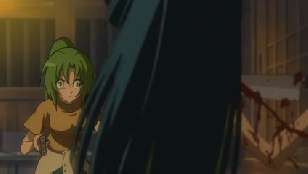 It is when the violence carries a meaning that it starts to get a bit disturbing.
It is when the violence carries a meaning that it starts to get a bit disturbing.
The picture on the right is from the series "Higurashi no Naku Koro ni" (roughly: When the locusts cry [a cicada isn't a locust, but it is simpler to think of it as one if you don't know what a cicada is]). This series was a mind-bend, more or less repeating the same sequence of events over and over in different story arcs where things are subtely different. Your job, dear viewer, is to figure out what the heck is going on. Oh, and it involves children massacring each other, adults, and more often than not themselves. Notice in the picture the girl stabbing herself in the head is... stabbing herself in the head.
It is a rather disturbing series. To say more would be spoilers.
And then it kicks up a gear, when the penny finally drops and it is a them-or-us situation.
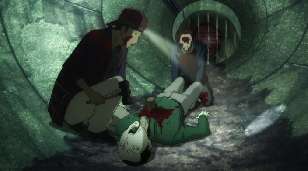
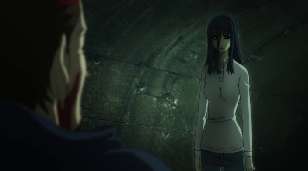
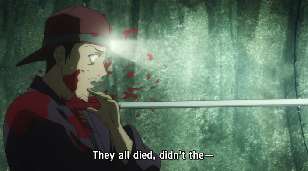
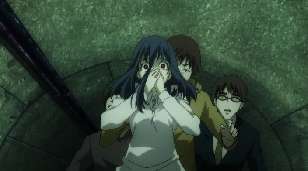
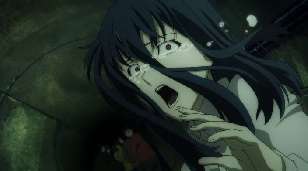
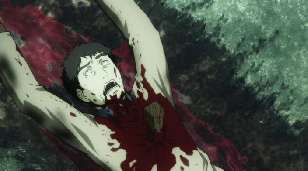
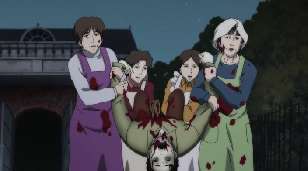
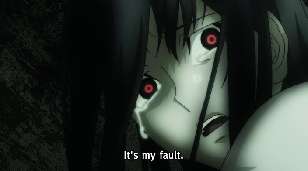
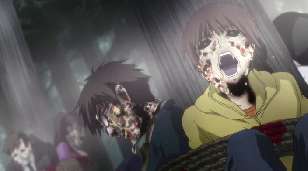
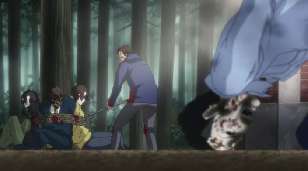
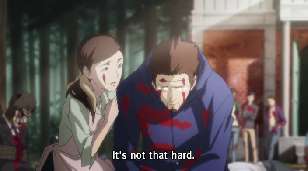
But we, you and I, cannot say "no", either.
Not with any certainty.
No comments yet...
| © 2011 Rick Murray |
This web page is licenced for your personal, private, non-commercial use only. No automated processing by advertising systems is permitted. RIPA notice: No consent is given for interception of page transmission. |